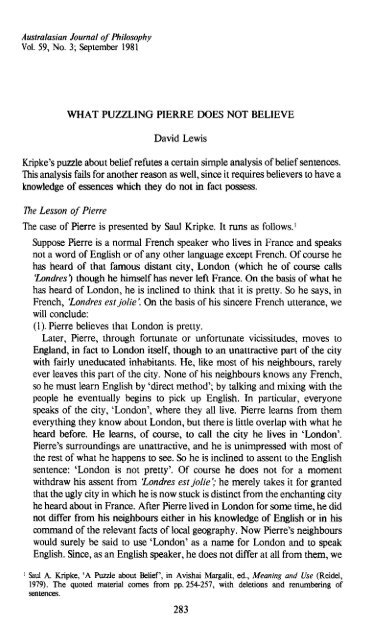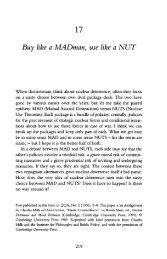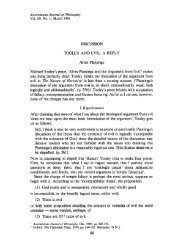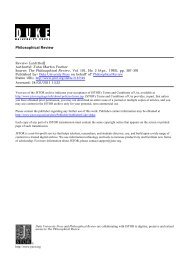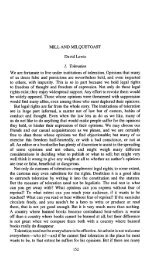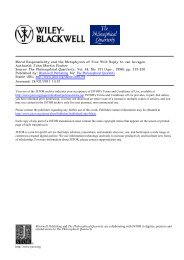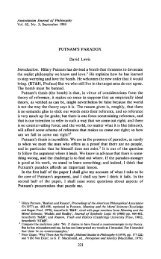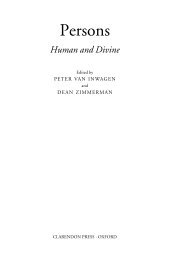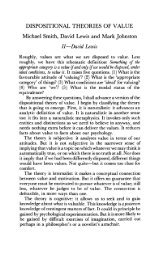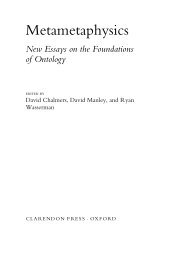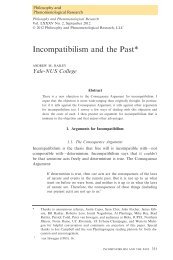What puzzling Pierre does not believe - Andrew M. Bailey
What puzzling Pierre does not believe - Andrew M. Bailey
What puzzling Pierre does not believe - Andrew M. Bailey
Create successful ePaper yourself
Turn your PDF publications into a flip-book with our unique Google optimized e-Paper software.
Australasian Journal of Philosophy<br />
Vol. 59, No. 3; September 1981<br />
WHAT PUZZLING PIERRE DOES NOT BELIEVE<br />
David Lewis<br />
Kripke's puzzle about belief refutes a certain simple analysis of belief sentences.<br />
This analysis fails for a<strong>not</strong>her reason as well, since it requires <strong>believe</strong>rs to have a<br />
knowledge of essences which they do <strong>not</strong> in fact possess.<br />
The Lesson of <strong>Pierre</strong><br />
The case of <strong>Pierre</strong> is presented by Saul Kripke. It runs as follows.1<br />
Suppose <strong>Pierre</strong> is a normal French speaker who lives in France and speaks<br />
<strong>not</strong> a word of English or of any other language except French. Of course he<br />
has heard of that famous distant city, London (which he of course calls<br />
'Londres) though he himself has never left France. On the basiS of what he<br />
has heard of London, he is inclined to think that it is pretty. So he says, in<br />
French, 'Londres estjolie'. On the basis of his sincere French utterance, we<br />
will conclude:<br />
(1). <strong>Pierre</strong> <strong>believe</strong>s that London is pretty.<br />
Later, <strong>Pierre</strong>, through fortunate or unfortunate vicissitudes, moves to<br />
England, in fact to London itself, though to an unattractive part of the city<br />
with fairly uneducated inhabitants. He, like most of his neighbours, rarely<br />
ever leaves this part of the city. None of his neighbours knows any French,<br />
so he must learn English by 'direct method'; by talking and mixing with the<br />
people he eventually begins to pick up English. In particular, everyone<br />
speaks of the city, 'London', where they all live. <strong>Pierre</strong> learns from them<br />
everything they know about London, but there is little overlap with what he<br />
heard before. He learns, of course, to call the city he lives in 'London'.<br />
<strong>Pierre</strong>'s surroundings are unattractive, and he is unimpressed with most of<br />
the rest of what he happens to see. So he is inclined to assent to the English<br />
sentence: 'London is <strong>not</strong> pretty'. Of course he <strong>does</strong> <strong>not</strong> for a moment<br />
withdraw his assent from 'Londres estjolie'; he merely takes it for granted<br />
that the ugly city in which he is now stuck is distinct from the enchanting city<br />
he heard about in France. After <strong>Pierre</strong> lived in London for some time, he did<br />
<strong>not</strong> differ from his neighbours either in his knowledge of English or in his<br />
command of the relevant facts of local geography. Now <strong>Pierre</strong>'s neighbours<br />
would surely be said to use 'London' as a name for London and to speak<br />
English. Since, as an English speaker, he <strong>does</strong> <strong>not</strong> differ at all from them, we<br />
Sad A. Kripke, 'A Puzzle about Belief', in Avishai Margalit, ed., Meaning and Use (Reidel,<br />
1979). The quoted material comes from pp. 254-257, with deletions and renumbering of<br />
sentences.<br />
283
284 <strong>What</strong> Puzzling <strong>Pierre</strong> Does Not Believe<br />
should say the same of him. But then, on the basis of his sincere assent to<br />
'London is <strong>not</strong> pretty', we should conclude:<br />
(2) <strong>Pierre</strong> <strong>believe</strong>s that London is <strong>not</strong> pretty.<br />
So now it seems that we must respect both <strong>Pierre</strong>'s French utterances and<br />
their English counterparts. So we must say that <strong>Pierre</strong> has contradictory<br />
beliefs. But there seem to be insuperable difficulties. We may suppose that<br />
<strong>Pierre</strong> is a leading philosopher and logician. He would never let contradictory<br />
beliefs pass. And surely anyone is in principle in a position to <strong>not</strong>ice and<br />
correct contradictory beliefs if he has them. But it is clear that <strong>Pierre</strong>, as long<br />
as he is unaware that the cities he calls 'London' and 'Londres'are one and<br />
the same, is in no position to see, by logic alone, that at least one of his beliefs<br />
must be false. He lacks information, <strong>not</strong> logical acumen.<br />
(3) He can<strong>not</strong> be convicted of inconsistency; to do so would be incorrect.<br />
Kripke presents the case as an unsolved puzzle. His principal moral is that<br />
whatever is responsible for this puzzle may also be the source of difficulties<br />
commonly blamed on failures of substitutivity.<br />
To solve the puzzle would be to show how (1), (2), and (3) are compatible.<br />
That would require an adequate analysis of (1) and (2) that would <strong>not</strong><br />
represent them as ascribing inconsistent beliefs. I have no such solution to offer,<br />
in part because some of the makings of the sort of solution I might favour are<br />
<strong>not</strong> mine to present?<br />
Instead, I shall make a negative point. There is a natural and straightforward<br />
analysis of (1) and (2) that <strong>does</strong> represent them as ascribing inconsistent<br />
beliefs. The case of <strong>Pierre</strong> refutes this analysis, thus clearing the way m let us<br />
hope -- for some less simple but more accurate successor. The refuted analysis<br />
consists of three parts.<br />
(4) '<strong>Pierre</strong> <strong>believe</strong>s that F(A)', where A is an ordinary proper name and F is an<br />
easily understood predicate, ascribes to <strong>Pierre</strong> a belief whose object is the<br />
proposition (actually) expressed by 'F(A)'.<br />
(5) This proposition holds at exactly those possible worlds where the thing<br />
which is (actually) de<strong>not</strong>ed by A has the property which is (actually) expressed<br />
by F.<br />
(6) Beliefs are jointly inconsistent if there is no possible world where their<br />
propositional objects hold true together.<br />
Given that we accept (1), (2), and (3), as I think we clearly must, this<br />
analysis stands refuted. For 'London' is an ordinary proper name, which<br />
(actually, and in this context) de<strong>not</strong>es the city London; 'is pretty' and 'is <strong>not</strong><br />
pretty' are easily understood predicates which (actually, and in this context)<br />
express strictly contradictory properties; so there is no possible world where<br />
anything, be it London or anything else, has the properties expressed by those<br />
two predicates.<br />
I think the refuted analysis has been held, but let me <strong>not</strong> stop to point the<br />
finger, It surely deserves to be held, but for its failures: it is simple and plausible,<br />
2 I have in mind some ideas about the analysis of belief sentences suggest~a:l by Robert Stalnaker<br />
(personal communication, 1979).
David Lewis 285<br />
and it fits perfectly into a systematic program for compositional semantics. If it<br />
did <strong>not</strong> exist, it would be necessary to invent it -- and to refute it.<br />
Several remarks before we go on. First, the refuted analysis as I stated it is<br />
limited in scope, and thereby dodges some extra problems that would plague its<br />
generalisations. Since A is an ordinary proper name, it is <strong>not</strong> a fictitious name<br />
with no actual de<strong>not</strong>ation. Likewise it is <strong>not</strong> first-person or present-tensed, so<br />
we avoid problems about self-descriptive belief. Since F is easily understood, it<br />
is <strong>not</strong> one of those semi-technical terms like 'elm', 'water', or 'arthritis', that are<br />
used at least somewhat competently by laymen who lack full mastery of their<br />
meanings; neither <strong>does</strong> it have any confusingly complex internal structure.<br />
Second, the refuted analysis has variants which equally stand refuted. There<br />
is the counterpart-theoretic variant: we amend (5) to consider <strong>not</strong> worlds where<br />
the thing de<strong>not</strong>ed by A is itself present to have the property expressed by F, but<br />
rather worlds where that thing has that property vicariously, through a unique<br />
counterpart which is united to it by some sort of resemblance and which stands<br />
in for it at that world) (A variant permitting multiple, rather than unique,<br />
counterparts would so far escape refutation on a technicality; but would fall<br />
victim to the considerations discussed in the next section.) Thus the London of<br />
our world is vicariously pretty at a world where it <strong>does</strong> <strong>not</strong> exist, strictly<br />
speaking, if it has at that world a unique counterpart and that counterpart is<br />
pretty. Such a world might well be counted as one where the proposition<br />
(actually) expressed by 'London is pretty' holds.<br />
Also there is the ersatz variant: we systematically replace possible worlds and<br />
individuals, and properties thereof, by stand-ins constructed entirely out of the<br />
resources of this world. 4 An ersatz variant will be counterpart-theoretic as well,<br />
unless the ersatz worlds are so constructed that London itself, for instance,<br />
always is used as the ersatz for any unactualised alternative London.<br />
Third, <strong>not</strong>ice that to refute the analysis given by (4)-(6) is <strong>not</strong> yet to refute<br />
the theory that beliefs have propositional objects, where a proposition is<br />
something fully characterised by the set of worlds where it holds. It is one<br />
question what the objects of belief are, a<strong>not</strong>her question how the 'that'-clause of<br />
a belief sentence specifies the object of the ascribed belief. In fact, I think the<br />
refuted analysis is wrong on both points: but in this paper I shall be content to<br />
show that there's something wrong with it somewhere. And there is, as witness<br />
Kripke's puzzle.<br />
Ignorance of Essence<br />
However, we do <strong>not</strong> really need the whole of the puzzle of <strong>Pierre</strong> to see that the<br />
refuted analysis goes wrong. False accusations of inconsistency between beliefs<br />
are but a symptom. The cause of the trouble can be seen even if we consider<br />
3 See my 'Counterpart Theory and Quantified Modal Logic', Journal of Philosophy 65 (1968),<br />
pp. 113-126; and Counterfactuals (BlackweU, 1973), pp. 39-43.<br />
4 See, for instance, the construction of ersatz worlds in W. V. Quine, 'Propositional Objects', in his<br />
Ontological Relativity and Other Essays (Columbia University Press, 1969).<br />
5 On objects of belief, but <strong>not</strong> the analysis of belief sentences, see my 'Attitudes De Dicto and De<br />
Se" The Philosophical Review 88 (1979), pp. 513-543.
286 <strong>What</strong> Puzzling <strong>Pierre</strong> Does Not Believe<br />
beliefs one at a time. Let us stick to the case of <strong>Pierre</strong>, and consider whether the<br />
refuted analysis accounts even for the truth of (1). I say it <strong>does</strong> <strong>not</strong>. (It likewise<br />
fails to account for the truth of (2).) <strong>Pierre</strong> <strong>does</strong> <strong>not</strong> have as an object of his<br />
belief the proposition (actually) expressed by 'London is pretty'. For there is a<br />
possible world which fits <strong>Pierre</strong>'s beliefs perfectly -- it is one of his 'belief<br />
worlds' m at which that proposition is false.<br />
I have in mind a world where the beautiful city <strong>Pierre</strong> heard about was <strong>not</strong><br />
London but Bristol. Imagine a world just like ours until fairly recently (except to<br />
the extent that it must differ to fit <strong>Pierre</strong>'s misconceptions about earlier history,<br />
if any). Then the beautification of Bristol was undertaken, and at the same time<br />
it was renamed in honour of Sir Ogdred Londer. The French called this famous<br />
city 'Londres ~ they spoke often of its beauty, and all they said was true. In due<br />
course <strong>Pierre</strong> heard of the beauty of Bristol, lately called 'Londer' in England<br />
and 'Londres'in France, and he came to assent sincerely to 'Londres estjolie'.<br />
<strong>What</strong> happened at his end was just like what happened at the real world.<br />
While Bristol was beautified, London fell into decay. The better parts were<br />
demolished m copies sometimes were built in Bristol, alias 'Londer' E and only<br />
the slums remained. London became ugly through and through. Also,<br />
<strong>not</strong>hing of consequence happened there. The French had little occasion to<br />
speak of the place under any name, and indeed it never was mentioned in<br />
<strong>Pierre</strong>'s presence. It was to this place that the unfortunate <strong>Pierre</strong> was made to<br />
go. Again, what happened at <strong>Pierre</strong>'s end of his encounters with London was<br />
just like what happened at the real world.<br />
This world fits <strong>Pierre</strong>'s beliefs perfectly. For all that he <strong>believe</strong>s, it might very<br />
well be the world he lives in. Tell him and show him all about it, claiming that it<br />
is the real world; he will never be at all surprised, unless it surprises him to find<br />
that he has turned out to be right in all his beliefs without exception. Nothing he<br />
<strong>believe</strong>s E no Propositional object of his belief -- is false at this world.<br />
However, the proposition (actually) expressed by 'London is pretty'<br />
according to (5), or a counterpart-theoretical or ersatz-theoretic variant thereof,<br />
is false at this world. 'London' de<strong>not</strong>es London and 'is pretty' expresses the<br />
property of being pretty, and this is a world where London, or a good<br />
counterpart or ersatz, is present and is <strong>not</strong> at all pretty.<br />
(In a parallel way, we could find a world which fits <strong>Pierre</strong>'s beliefs, but in<br />
which the proposition expressed according to (5) by 'London is <strong>not</strong> pretty' is<br />
false. We could even find a belief world for <strong>Pierre</strong> where the propositions<br />
expressed by 'London is pretty' and 'London is <strong>not</strong> pretty' both are false. Let<br />
the city he heard of in France be a beautified Bristol, renamed 'Londer' or<br />
'Londres'; let the city he fetches up in be a worsened Manchester, renamed<br />
'London'; and let London itself be absent altogether.)<br />
Therefore (4) and (5) are <strong>not</strong> both true. ((6) is <strong>not</strong> involved in this<br />
refutation.) I see no grounds for blaming the trouble on (5); I take (5) to be<br />
correct, either as it stands or when restated in terms of counterparts. The culprit<br />
is (4). The role of the 'that'-clause in a belief sentence is <strong>not</strong>, in such cases as<br />
this, to express the proposition which is the object of the ascribed belief.<br />
The error of (4) amounts to ascribing a knowledge of essences that we may
David Lewis 287<br />
<strong>not</strong> in fact possess. Let us define the essence of London as that property that<br />
belongs to London at every world where it exists, and to <strong>not</strong>hing else at any<br />
world. (Or it belongs to all and only counterparts of London, or to all and only<br />
ersatz Londons.) <strong>What</strong> <strong>Pierre</strong>'s belief that London is pretty is about is that<br />
which plays the role of London for him; or rather, that which plays one of the<br />
London-roles for him. It may or may <strong>not</strong> be London. If being the X is London's<br />
essence, it may or may <strong>not</strong> be the X. Having London's essence is <strong>not</strong> a<br />
prerequisite for playing the London-rote. Thus <strong>Pierre</strong> <strong>does</strong> <strong>not</strong> <strong>believe</strong> that<br />
London is the X, or even that London is the X if anything is; and this despite<br />
the fact that he <strong>believe</strong>s the proposition that holds at every world, and every<br />
world is a world where London is the X if anything is. Because of this<br />
ignorance, he is unable to get from his belief that London is pretty to a belief<br />
having as object the proposition that the X is pretty -- or in other words, to the<br />
proposition expressed by 'London is pretty'.<br />
Objections and Replies<br />
Objection. Why are you entiffed to assume that the so-called Bristol (or<br />
'Londer', or 'Londres') of the counterexample world is <strong>not</strong> really London? I<br />
reply: on my view of these matters, it isn't London because there is no identity<br />
across worlds; and it isn't a counterpart of London because it isn't very much<br />
like London, ,and because there is a rival candidate that resembles the real<br />
London very much better. This is so if we consider location; or match of<br />
origins; or resemblance of histories; or resemblance of present geography; or<br />
even, <strong>not</strong> completely but to a sufficient degree, resemblance of landmarks. (All<br />
the ugly landmarks of London and all the pretty landmarks of Bristol remain.<br />
Although Bristol <strong>does</strong> have its copies of the Houses of Parliament and Tower<br />
Bridge and one or two more, these being the ones <strong>Pierre</strong> was shown pictures of<br />
when he was in France, they're quite poor copies -- he was shown quite poor<br />
pictures.) On an opposite view, according to which there is identity across<br />
worlds and it varies quite independently of qualitative character, there are<br />
worlds of the sort I imagined where the so-called Bristol is really London, and<br />
others where it isn't. I hereby stipulate that the counterexample world is one of<br />
the latter ones. On an intermediate view, essentialist but Haecceitist, there are<br />
no qualitative conditions sufficient for identity across worlds, but match of<br />
origins is a necessary condition; and the so-called Bristol fails to satisfy this<br />
qualitative prerequisite for identity with the real London. It may or may <strong>not</strong> be<br />
the real Bristol, but London it definitely isn't. These three views seem to cover<br />
the spectrum of reasonable positions fairly well.<br />
Objection. The so-called Bristol is a counterpart of London at least for <strong>Pierre</strong>.<br />
His epistemic rapport with it at the counterexample world is just like one part of<br />
his epistemic rapport with London at the real world. In this respect, the<br />
otherworldly Bristol resembles the real London. It is London if, in Jaakko<br />
Hintikka's terminology, we cross-identify by acquaintance. 6 1 reply: yes. This is<br />
6 See his 'The Logic of Perception', in his Mode&for Modalities (Reidel, 1969), and in Norman S.
288 <strong>What</strong> Puzzling <strong>Pierre</strong> Does Not Believe<br />
true, and relevant, and perhaps something that would figure in a satisfactory<br />
analysis of (1) and (2). But it can<strong>not</strong> save the refuted analysis. A counterpart by<br />
acquaintance for <strong>Pierre</strong> is <strong>not</strong> a counterpart simpliciter; the relativity to <strong>Pierre</strong> is<br />
<strong>not</strong> provided for in (4) and (5). They are stated in terms of a sentence<br />
expressing a proposition, and our <strong>not</strong>ion of expressing includes no such<br />
relativity. Other relativities, yes: to language, and to context. But <strong>not</strong> the<br />
relativity involved in cross-identification by acquaintance for <strong>Pierre</strong>.<br />
Objection. You forget Kripke's emphatic stipulation (op. cit., pp. 242 and 246<br />
that he is speaking always of belief de dicto, never of belief de re. Given this<br />
stipulation, (1) and (2) mustbe interpreted according to (4) and (5). Ireply that<br />
Kripke may stipulate that (1) and (2) are to be interpreted according to a<br />
certain analysis, or he may invite us to rely on our intuitions about their truth.<br />
But he can<strong>not</strong> do both without begging the question in favour of the preferred<br />
analysis. However, it is <strong>not</strong> at all clear to me what Kripke is stipulating. The<br />
<strong>not</strong>ion that ordinary language belief sentences divide into de dicto and de re,<br />
without residue or overlap, may be part of an oversimplified semantic analysis.<br />
The stipulation that (1) and (2) are <strong>not</strong> de re seems clearer and safer than the<br />
stipulation that they are de dicto; for we can support it by a parallel puzzle in<br />
which no res is available. (<strong>Pierre</strong> has been told in France that 'Pere Noel'brings<br />
presents to all the children, and has been told in England that Father Christmas<br />
brings presents only to the good children. He reckons that good children get<br />
double shares.) But the stipulation that (1) and (2) are something other than de<br />
re, even if legitimate, is <strong>not</strong> enough by itself to settle that we must interpret<br />
them by (4) and (5).<br />
Objection. 'Believes that' and '<strong>believe</strong>s the proposition that' are synonymous. I<br />
reply: maybe so. But in that case, '<strong>believe</strong>s the proposition that' must <strong>not</strong> be<br />
analysed as 'has a belief with the propositional object expressed by' (with<br />
quotation marks supplied), at least <strong>not</strong> if the latter bears the meaning I have<br />
given it in this paper.<br />
Objection. The counterexample world is <strong>not</strong> a world that fits <strong>Pierre</strong>'s beliefs.<br />
For <strong>Pierre</strong> <strong>believe</strong>s that London is pretty, whereas the counterexample world is<br />
one where London is <strong>not</strong> pretty. I reply by posing a dilemma. When we<br />
characterise the content of belief by assigning propositional (or other) objects,<br />
are we characterising an inner, narrowly psychological state of the <strong>believe</strong>r?<br />
Are beliefs in the head? Or are we characterising partly the <strong>believe</strong>r's inner<br />
state, partly the relations of that state to the outer world? 7 If it is the latter, the<br />
objection may succeed; however, Kripke's puzzle vanishes. For if the<br />
assignment of propositional objects characterises more than the <strong>believe</strong>r's inner<br />
state, then there is no reason to suppose that a leading philosopher and logician<br />
Care and Robert M. Grimm, ~ls., Perception and Personal Identity (Case Western Reserve<br />
Universiiy Press, 1969).<br />
7 Compare characterising perceptual experience without regard to whether it is veridical versus<br />
characterising the perceiver's accomplishments in gaining information about the world around<br />
him. I owe this comparison to John Perry.
David Lewis 289<br />
would never let contradictory beliefs pass, or that anyone is in principle in a<br />
position to <strong>not</strong>ice and correct contradictory beliefs if he has them. Anyone is in<br />
principle in a position to <strong>not</strong>ice and correct a state of the head which can be<br />
characterised by assigning contradictory propositional objects, but why should<br />
philosophical and logical acumen help him if the trouble lies partly outside? As<br />
soon as we accept the consistency of <strong>Pierre</strong>'s beliefs as a datum -- as I did, on<br />
Kripke's invitation -- we are committed to the narrowly psychological<br />
conception of belief and its objects. (I would like to think that this was what<br />
Kripke intended in instructing us to consider belief de dicto.) But on the<br />
narrowly psychological conception, the counterexample world <strong>does</strong> fit <strong>Pierre</strong>'s<br />
beliefs, as witness the fact that it would <strong>not</strong> at all surprise him to be persuaded<br />
that the world was just that way. To be sure, it is <strong>not</strong> a world where London is<br />
pretty. That only means that (1) is <strong>not</strong> a narrowly psychological<br />
cbaracterisation. Indeed <strong>not</strong>; we can see that directly. Someone might be exactly<br />
like <strong>Pierre</strong> psychologically and yet <strong>not</strong> <strong>believe</strong> that London is pretty. The <strong>Pierre</strong>counterpart<br />
at the counterexample world is one such person. A<strong>not</strong>her is an<br />
actual <strong>Pierre</strong>-counterpart on Twin Earth, long ago in a galaxy far, far away. His<br />
neighbours might say of him 'He <strong>believe</strong>s that London is pretty'; but we have<br />
no business saying it, given what 'London' means in our mouths and given his<br />
isolation both from our London and from our 'London'. Since (1) is <strong>not</strong> a<br />
narrowly psychological characterisation of <strong>Pierre</strong>'s beliefs, it is irrelevant to the<br />
question whether the counterexample world fits <strong>Pierre</strong>'s beliefs on the narrowly<br />
psychological conception. 8<br />
Australian National University<br />
and<br />
Princeton University Received August 1980<br />
I am grateful to the Australian National University for research support, and to several<br />
philosophers there and elsewhere for valuable discussion. Special thanks are due to Nathan<br />
Salmon.


